Skills are the key to unlocking a wealth of positive business impacts like driving workforce change, scaling personalized development, improving organizational agility, and boosting employee performance—and more and more your business should pay attention.
With 98% of business executives planning to incorporate more skills-based approaches, aggregating, analyzing, and acting on essential skills and skill data is no longer an option for L&D, HR, Talent, and Change Management professionals.
Indeed, savvy organizations are already incorporating skills-based strategies, and they’re seeing impressive results. They’re 98% more likely to retain high performers, 57% more likely to be agile, and 107% more likely to place talent efficiently.
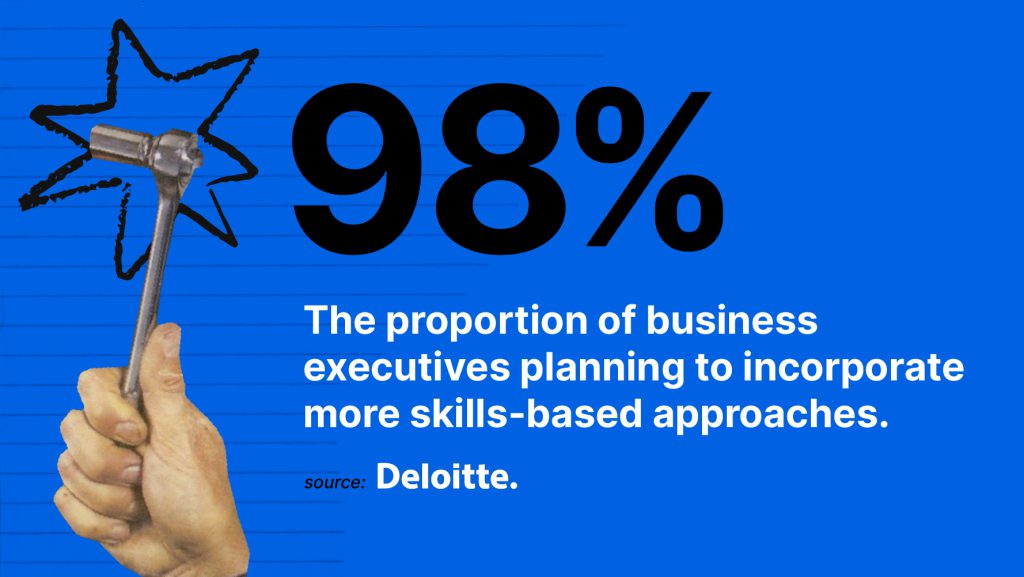
It’s time to put skills and skill data to work.
Let’s face it: harnessing skills is complicated when you’re getting started.
Luckily, Degreed has been working on this for years. Recognizing essential skills, making skills actionable, and driving impactful learning has underpinned the Degreed mission from Day One. For years, we’ve helped organizations simplify the process of identifying changes in their skill supplies. We’ve helped them scale learning through personalized development. And we’ve helped them measure change to show impact.
Degreed can help you too, by putting essential skills and skill data to work across your organization, so you can develop your workforce to be ready for anything.
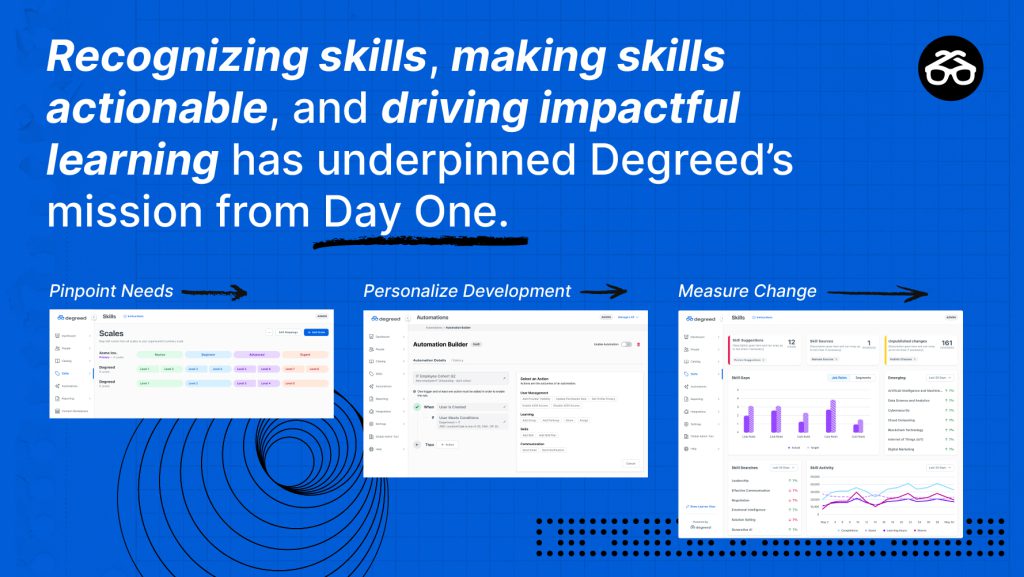
Using Skills to… Pinpoint Needs
To get started, you need skill data. But obtaining data on your workforce is easier said than done. That’s why Degreed tackles this challenge in three ways.
1. Inferring Skills
Skills inference extracts information about your employees’ skills from existing sources like resumes and job descriptions, so you can quickly and easily gather data on the skills of your workforce. We offer skills inference in multiple aspects of our solution.
For example, when learners onboard with the Degreed LXP, we help populate their skill profiles by suggesting skills based on their job roles and resumes. And by using AI to automatically map skills to roles, we make it easy to get started identifying what skills you need for the roles at your organization. We’re even exploring new AI skills inference capabilities to discover hidden talent at your company.
2. Assessing Skills
It’s important to understand not only what skills your workforce has, but at what levels of expertise. That’s why we offer multiple methods to indicate proficiency levels, including Self Ratings, Manager Ratings, and Peer Ratings to provide a high fidelity view of your people’s skills. Adaptive questionnaires provide another method for validating your people’s skills and skill levels.
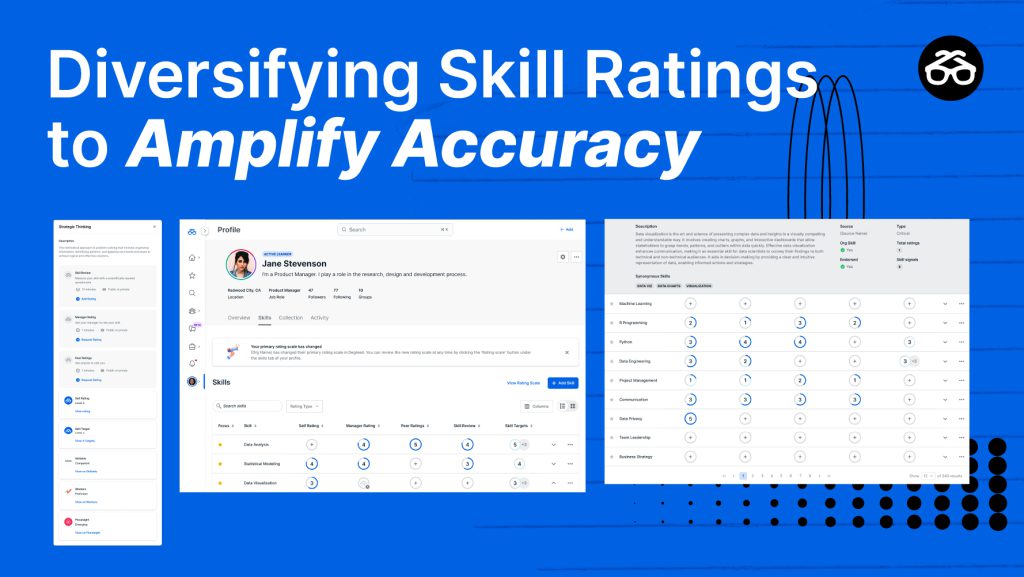
3. Managing Skill Data
To manage skill data, you need tools to analyze and understand your skill supply, fill data gaps, manage your taxonomy, and normalize skill data and labels from across your ecosystem. Degreed Skills does exactly that.
Degreed enables skill scale normalization. A skill scale measures skill proficiencies, typically using a numeric range. With Degreed you can normalize inconsistent scales from across your learning and HR tech stack—so you can measure all skills against the same rubric: yours.
Let’s say your organization wants to measure skill proficiency using a 4-point scale, but your HCM uses a 5-point scale and your LXP an 8-point scale. Degreed normalizes those differences from across your tech stack, so you can see all your skill data in your preferred scale.
Similarly, the tools across your tech stack likely use different skill labels. For example, your HCM may use the word “Innovate” as a skill label, but your LXP may use “Innovative” as the label for the same skill. With Degreed, you can normalize skill labels so they’re consistent. In addition, Degreed removes duplicates, misspellings, and synonyms and accounts for multiple languages.
And while AI makes recommendations for normalization, with Degreed you’re ultimately in the driver’s seat. You can override AI recommendations, meaning you have more control over your data.
In addition, our taxonomy management features empower you to create and leverage a bespoke taxonomy that meets your organization’s needs.
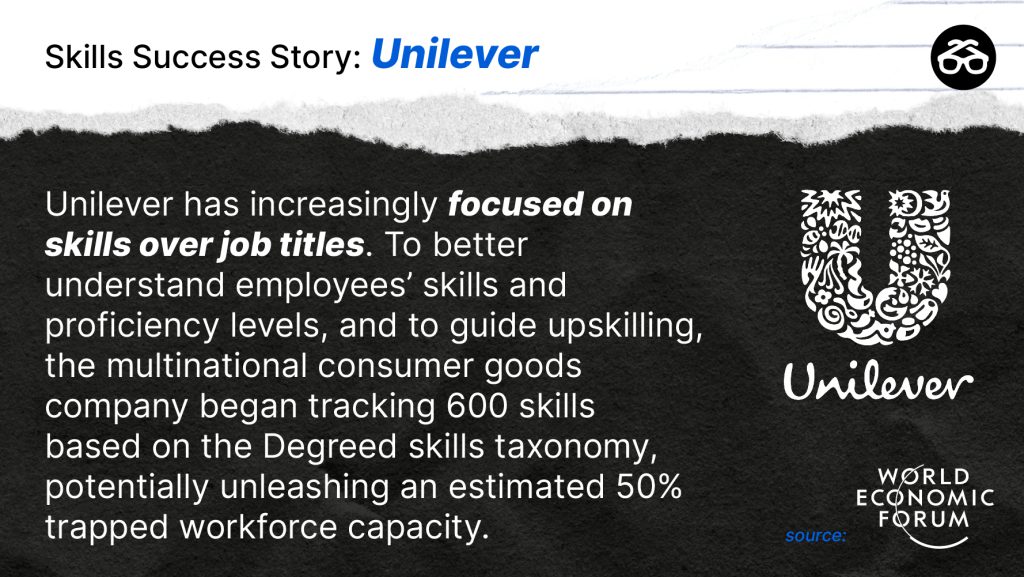
Using Skills to… Personalize Development
Once you have skill data, it’s time to put that data into action to drive better outcomes. But how do you use skill data to better personalize learning?
Degreed helps you. . .
Orchestrate learning using skill data.
To orchestrate learning, you need to deliver the right learning to the right people at the right time. Degreed empowers this in many ways.
With Degreed, you can create segments of learners based on many factors—including their skills and skill levels—and then automatically assign learning or send messages and nudges to those segments.
For example, you can create a segment of everyone at your organization with a skill level 1 in Artificial Intelligence and then assign everyone in that segment foundational learning that is essential to leveraging AI at your business. You can even use Automations to send nudges that remind learners to complete that content.
Degreed also helps you. . .
Connect learners based on based skills.
Research shows that 75% of people prefer learning with others over learning by themselves. Harnessing skill data is a perfect way for you to facilitate that colleague-to-colleague learning collaboration.
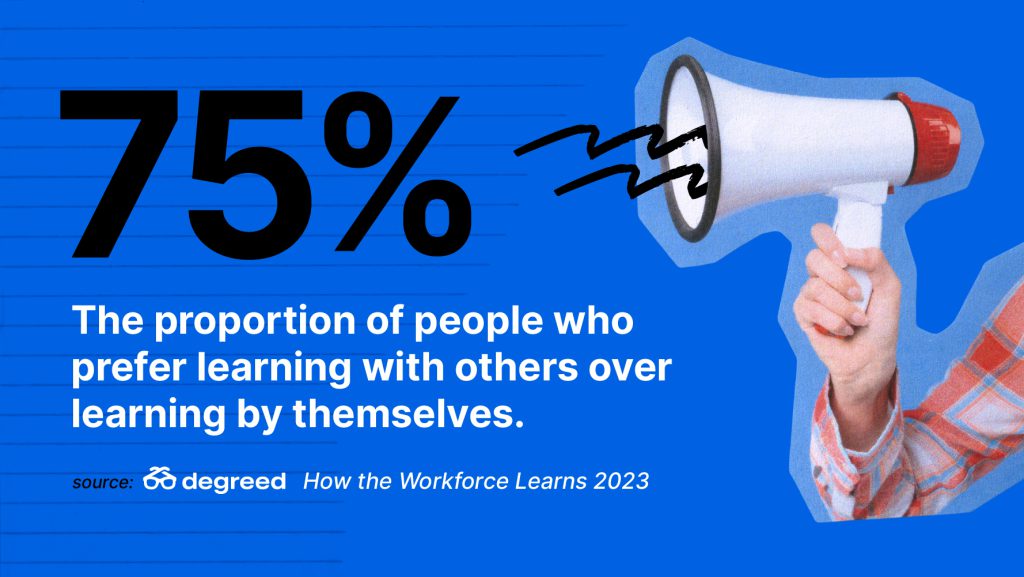
In Degreed, manager dashboards show people leaders data about what skills their team members have, enabling those managers to optimize team strengths and coach individuals on where to focus for maximum growth. With Degreed, you can also use skill data to automatically recommend mentors to individual learners based on the skills learners want to grow.
And Degreed helps you. . .
Curate experiences for skill growth.
High-quality curation incorporates skill data, to ensure people receive the right learning and experiences they need to grow critical skills at speed and scale.
In Degreed, you can curate Plans and Pathways to target the growth of skills important to your organization’s success. In addition, you can create Academies that provide your people with cohort-based learning opportunities for deep skill building.
In addition, Degreed helps your people to. . .
Discover resources that are personalized according to an individual’s skill profile.
Learning is impactful when it’s relevant to the learner, which is why it’s so important to help your employees discover the right content for their needs and goals.
When learners search for learning resources inside the Degreed LXP, our AI surfaces personalized, relevant content and experience recommendations based on the individual’s skills, goals, and experiences.
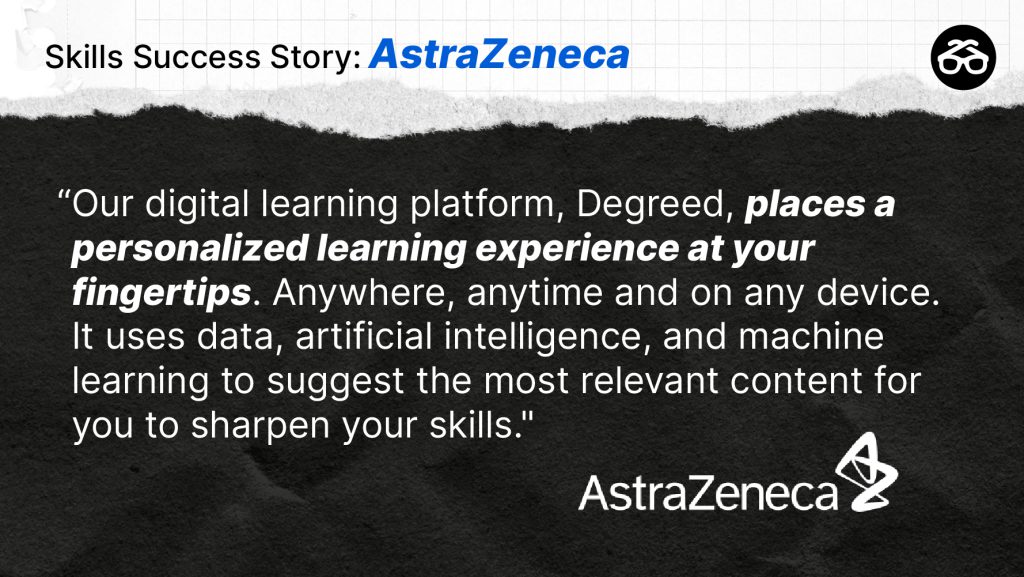
Using Skills to… Measure Change
Once you’ve accomplished skill growth, it’s important to show off your results. With Degreed, you can measure skill growth to demonstrate the impact of learning across your business.
Degreed skill analytics provide powerful visualizations that simplify complex skill data—so you can uncover the impact of learning on skill growth, identify supply and demand of skills across your organization, and make smarter investments in your people.
All employees using Degreed have a skill profile where they list their current skills, they select focus skills, they obtain skill ratings, and they track experiences and content tied to their skill development. Not only do these profiles help drive a personalized learning experience, they also allow individuals to track their development and growth.
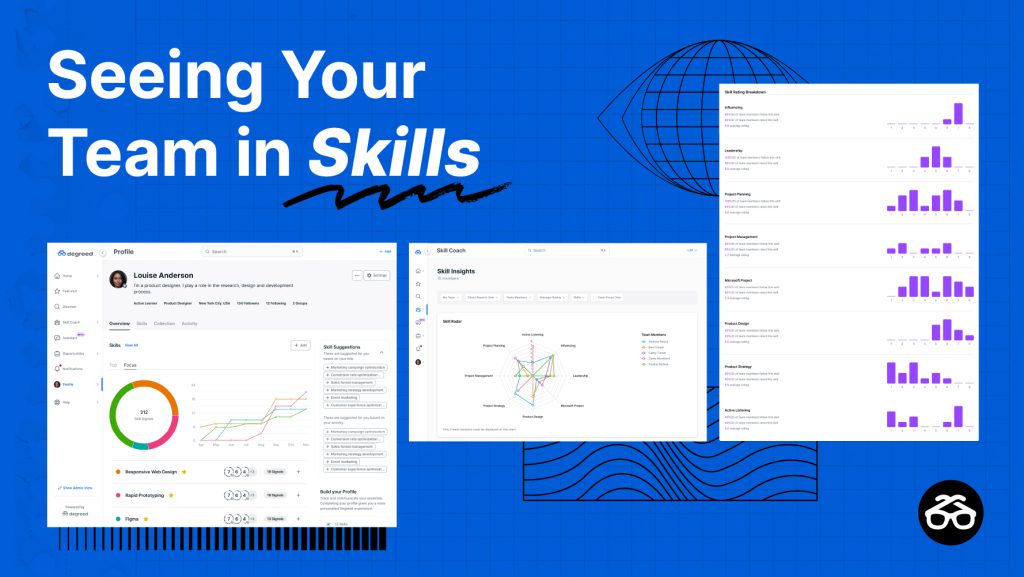
But measuring change shouldn’t happen in a silo. Combining data from across your Learning and HR ecosystem provides a more holistic view of change and helps you capitalize on it, for example by identifying talent for projects and roles. That’s why interoperability achieved through integrations like our bi-directional skills sync with Workday is so important to Degreed. It allows distinct systems to easily share information and work together, and it reduces the manual work of combining data from multiple tools.
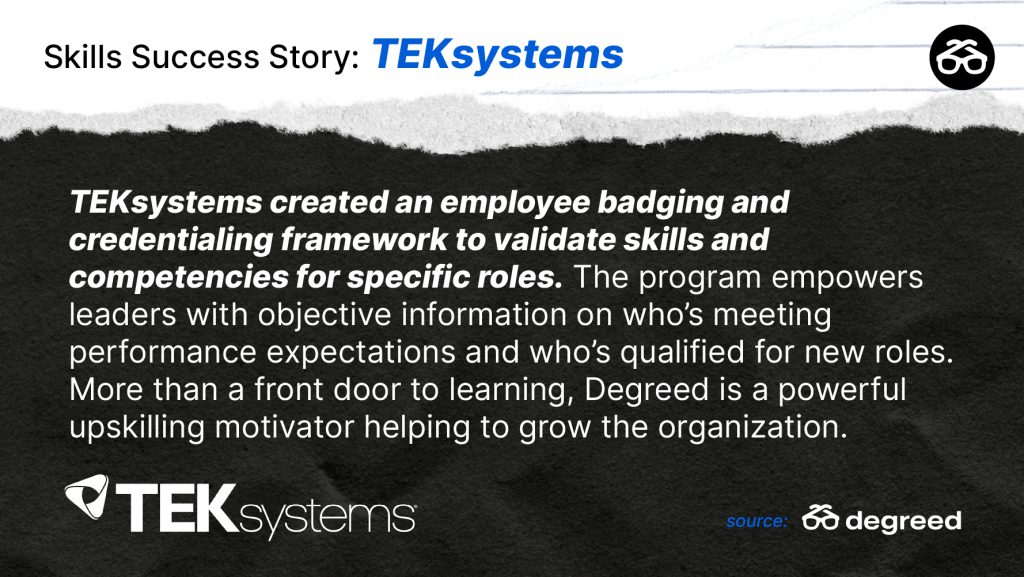
What This All Means for Your Business
Pinpointing needs, personalizing development, and measuring change are great, but why do they matter?
These actions matter because they unlock your ability to develop a workforce that’s ready for anything. From market shifts and competitive threats to economic shocks, there’s no telling what the future holds. That’s why it’s so important to develop an agile workforce and put mechanisms (like efficient, personalized learning) into place to facilitate agility and allow your people and your business to respond effectively to changes and challenges.
This is how you transform the people you have into the employees your business needs.
Find out more.
Start using skills to transform your workforce.
Leading organizations around the globe use Degreed to prepare for the future, pinpoint their needs, personalize development, and measure change.
Ready to learn more about how Degreed can help you know, learn, and grow the skills your business needs? Get a Degreed demo today.

